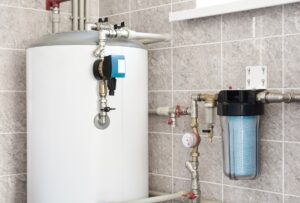For the majority of homeowners in our area, tank water heating systems are the tried and true method of heating water. It’s been this way for a very long time, since tankless (or “on-demand”) water heaters have only been around for a few decades. Since the old days, people would heat up a pot or tank of water and use that throughout the day.
Newer tank water heaters are more energy efficient and powerful. Sometimes, it can be easy to forget that it’s working in the first place. This is ultimately a good thing, because they let us focus on the important parts of life. But there’s one component of your tank water heater that shouldn’t be forgotten about. And if you do forget about it, you might need a new water heater installation in Castle Rock, CO. We’re, of course, talking about the sacrificial anode rod!
What Is the Anode Rod?
The sacrificial anode rod is a component in your water heater that takes most of the chemical reaction known as “corrosion.” Since corrosion can’t happen everywhere all at once, the ions that cause this problem are attracted to this component that doesn’t really do anything else. Then, when it finally corrodes and falls apart, it can be replaced by a new one.
This protects the walls and interior structure of your tank water heater. Without a sacrificial anode rod, your tank water heater wouldn’t last for very long.
How Long Does It Last?
A sacrificial anode rod can last anywhere from 3-5 years, sometimes more and sometimes less. This will mainly depend on the quality of your water. Water with fewer minerals, more oxygen, and more ions, will corrode an anode rod faster than harder water that’s different. The important thing is to get your anode rod inspected and replaced when it’s needed.
The Concept of Corrosion
In order to understand the importance of your anode rod, we need to talk about corrosion. Corrosion is a chemical process that slowly degrades metallic substances over long periods of time. The metal reacts with oxygen in the air (or in your water), and gets structurally weaker as it turns into an “oxide.”
Why are we telling you this? Well, a water heater is going to undergo a certain amount of corrosion no matter what. While the inner lining of the tank is usually made of strong glass, it can break down eventually and get weaker as the water corrodes the pipes, joints, and casing. Eventually, the strong metal tank that you’re used to will be reduced to a corroded piece of junk that leaks all the time. With the help of your sacrificial anode rod, this can take over a decade to happen. When otherwise, it would take less time.
Signs You Need a New Water Heater
So, do you think your anode rod is in trouble? That could be a possibility. A compromised anode rod can lead to leaks, poor temperature control, and an inefficient water heater. These are all signs that your water heater is beginning to corrode and won’t last for much longer.
We’d advise any homeowners in this situation to schedule an inspection with one of our professionals. Then, we’ll either replace the anode rod, or discuss replacing your system in its entirety.
Don’t let your water heater surprise you. Schedule an appointment with SoCo Heating and Cooling for quality work. So Cool. So Cozy.

